Presearch—a decentralized and privacy-oriented search engine—has just launched PreGPT 2.0, marking the company’s latest attempt to challenge Big Tech’s dominance in the AI chatbot space.
The new release brought improved language models and a broader selection of open-source AI options, all running on a network of distributed computers rather than centralized data centers.
“Why am I so excited? Because PreGPT 2.0 is so powerful and unrestrained, that it has the potential to fundamentally disrupt the echo chamber effect that has long been manipulating conventional wisdom, amplifying the herd instinct into blind conformity,” Brenden Tacon, innovation and operations lead for Presearch, told Decrypt.
The upgraded chatbot comes with two subscription tiers: a $2 monthly basic plan running Mistral AI’s 7B model and a $5 pro version powered by Venice.ai’s more sophisticated LLMs. Both options promise to keep user data private and conversations unmonitored, with chats permanently erased upon deletion.
PreGPT 2.0’s model lineup features six of the most well-known names in the open-source AI space: Meta’s Llama-3.1-405b (a gigantic model), Llama-3.2-3b (a very small model built for efficiency) and Llama-3.3-70b (its latest LLM), Alibaba’s Qwen 32b.
It even leverages the old Dolphin 2.9 model, previously known in AI circles for being fully uncensored and powerful—and good at roleplay. The company also seems to have fine-tuned the Mistral 7B model to offer a custom version.
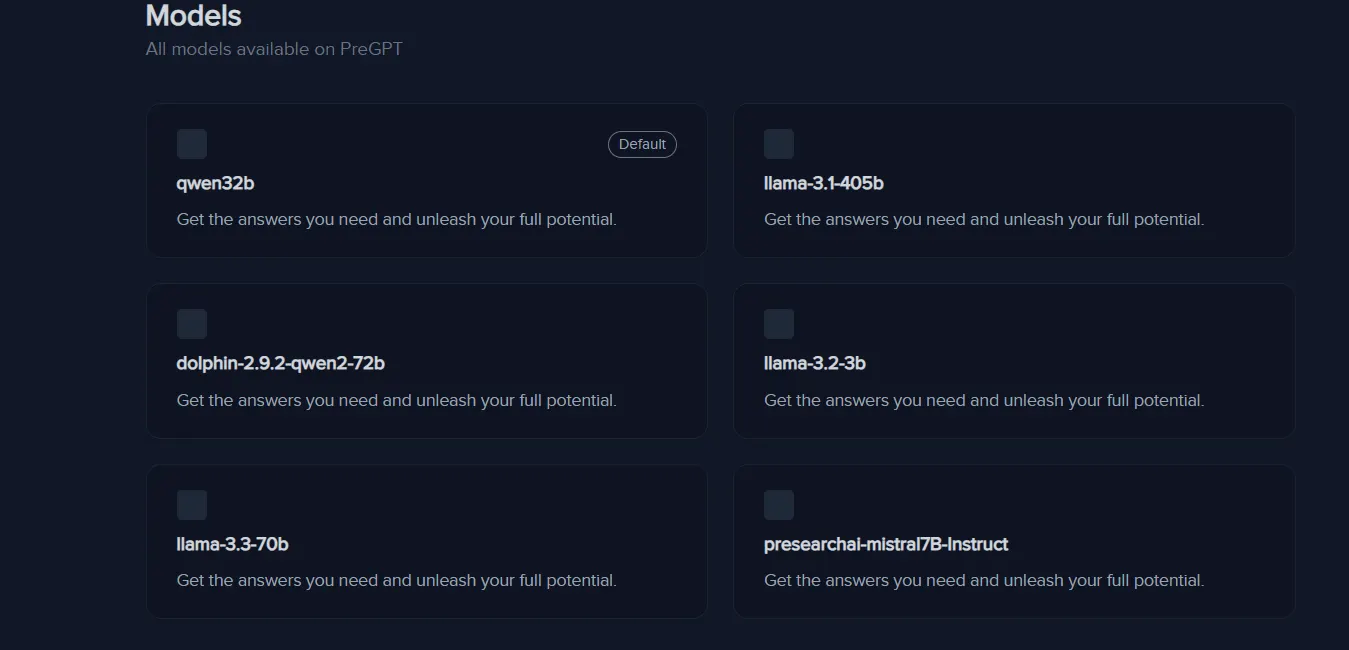
“This model gracefully handles a context of 8,000 Tokens, which equates to about 5,000 words, and you will be throttled to 1000 messages per month,” according to the company’s website.
This means the model will have a memory of 5,000 words and won’t be able to properly handle conversations that exceed such limit—or won’t process prompts that are that long.
What is Presearch?
Presearch, which launched in beta back in 2017 and went live in 2018, is basically a project that wants to reimagine search engine architecture with decentralized technology.
The platform processed over 12 million monthly searches through a web of independent nodes. Each node operator staked PRE tokens and lent computing power to the network, creating a self-sustaining ecosystem that scaled naturally with demand.
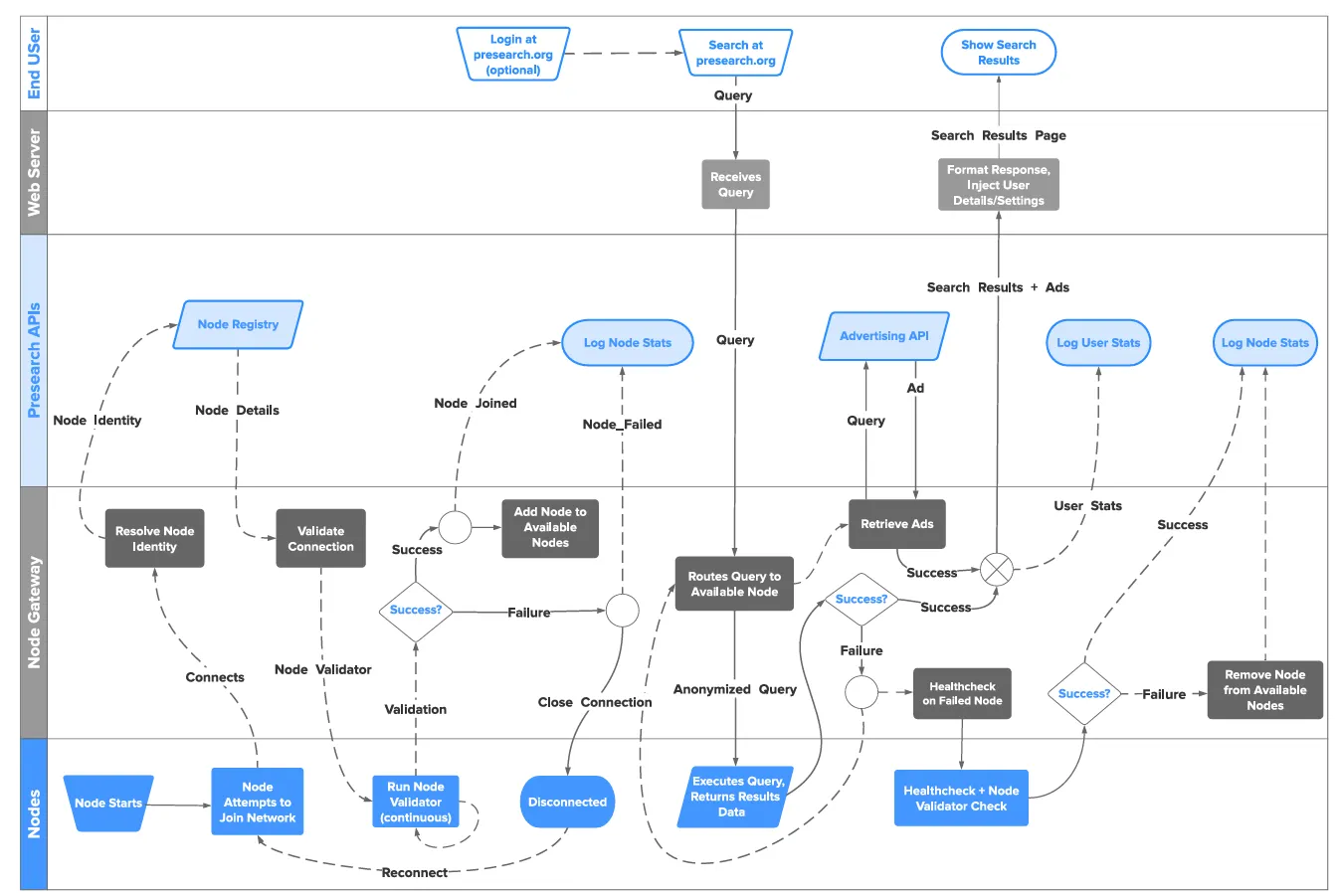
The idea is that a decentralized network makes the profiling of users—Google’s business model—harder and could help generate a business model that is more transparent and organic.
The platform’s advertising model is also different from what you see in Google or Bing, for example.
Instead of bidding wars for keywords, advertisers staked PRE tokens to gain visibility. The more tokens they stake, the better their placement will be—a system that reduces token circulation while creating predictable revenue.
A portion of these tokens get burned periodically, gradually decreasing the total supply from its current 590 million PRE in circulation.
PreGPT 2.0 leveraged this distributed infrastructure by collaborating with Venice.ai, a privacy-conscious AI service provider, and Salad.com, a community that shares decentralized GPU power.
The professional tier operates on Venice.ai’s high-performance network, while the basic plan is supported by Salad.com’s distributed GPU network.
Both pathways encrypt user interactions and refrain from storing chat logs, upholding Presearch’s commitment to privacy.
PRE’s tokenomics keeps the system running smoothly. Users earn up to 8 tokens daily for search queries, while node operators receive rewards based on their stake size and search volume.
This, at least in theory, seems like a win-win situation in which both users and advertisers are properly rewarded while helping the ecosystem grow.
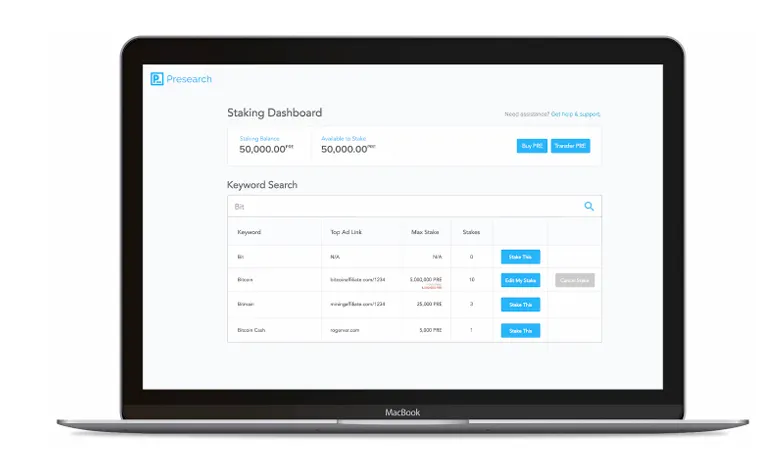
PreGPT 2.0 is a separate AI feature added to Presearch’s toolkit; the company remains focused on its core mission of decentralized, private search.
The chatbot integration is intended to complement the search experience without overshadowing it.
The goal is to make the entire platform ideal for privacy-conscious users who want a replacement for traditional web searches and are curious about using AI tools in their everyday lives.
Hands-On with PreGPT 2.0: Promise and Limitations
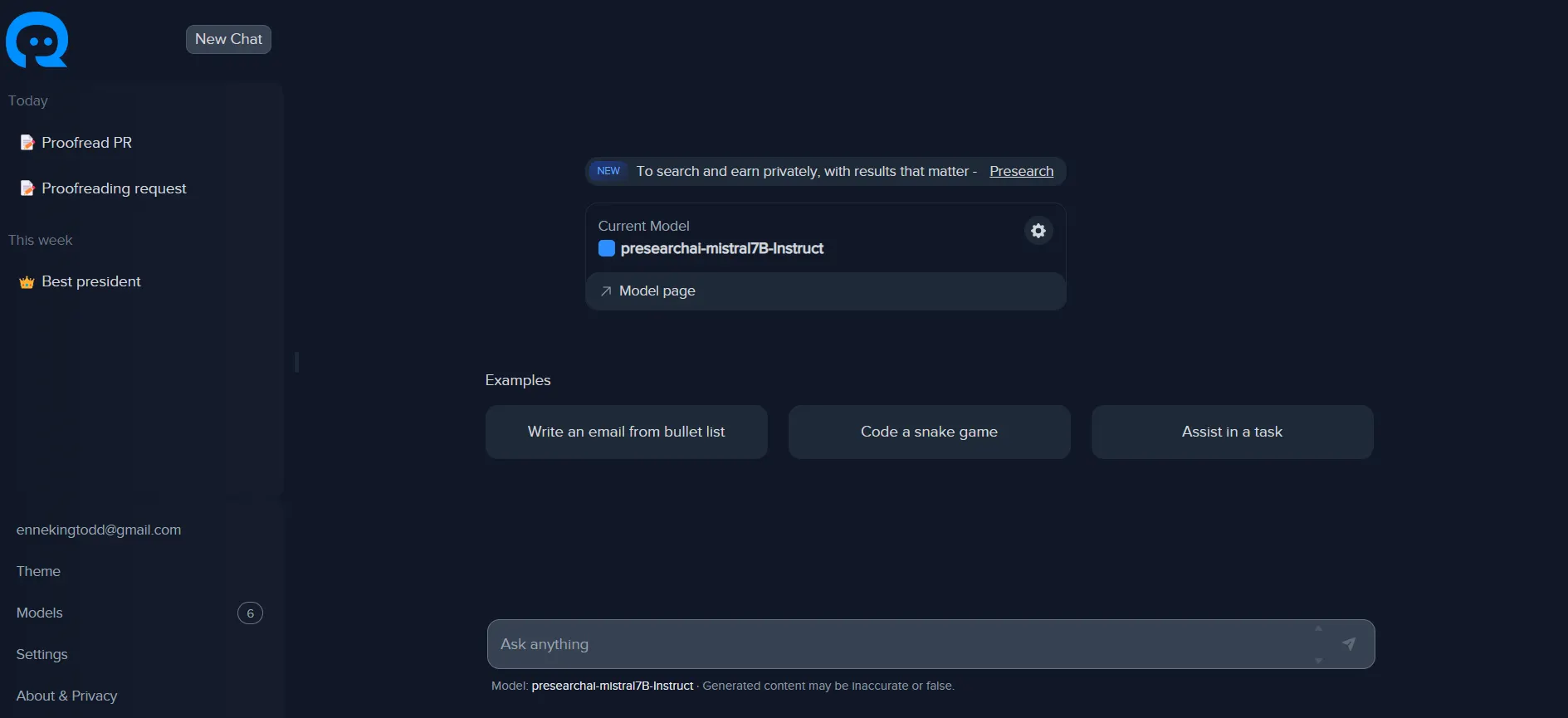
Testing PreGPT 2.0 revealed a capable chatbot that prioritizes function over flash. The interface felt cleaner than competitors like Venice.ai or Hugging Chat, though it lacked image generation capabilities that have become standard elsewhere.
The integration of a system prompt feature lets users fine-tune the AI’s behavior through custom instructions, which is helpful for getting more precise responses—a sound system prompt can dramatically increase a model’s performance.
The overall experience will feel familiar to those used to tinkering with different chatbots.
This wasn’t a revolutionary leap in AI capability but rather a privacy-focused implementation of existing open-source models that are often less powerful than mainstream alternatives like GPT-4o or Deepseek.
The platform only manages plain text. It can craft a bedtime story or summarize trends, but it lacks support for Excel documents and cannot properly format CSV files, PDFs, or third-party docs.
Instead, users must actually copy the contents of a sheet and paste it, which is far from ideal. Those who confuse decentralization with slow speeds have nothing to worry about.
The replies were fast, and the chatbot never hung. But the models offered the quality you’d expect from open-source LLMs that are not really topping the charts in the LLM Arena—LLama 3.1 405b is currently in the 27th position and is the most powerful model in Presearch’s roster.
It’s not bad, but it’s also not impressive by today’s standards.
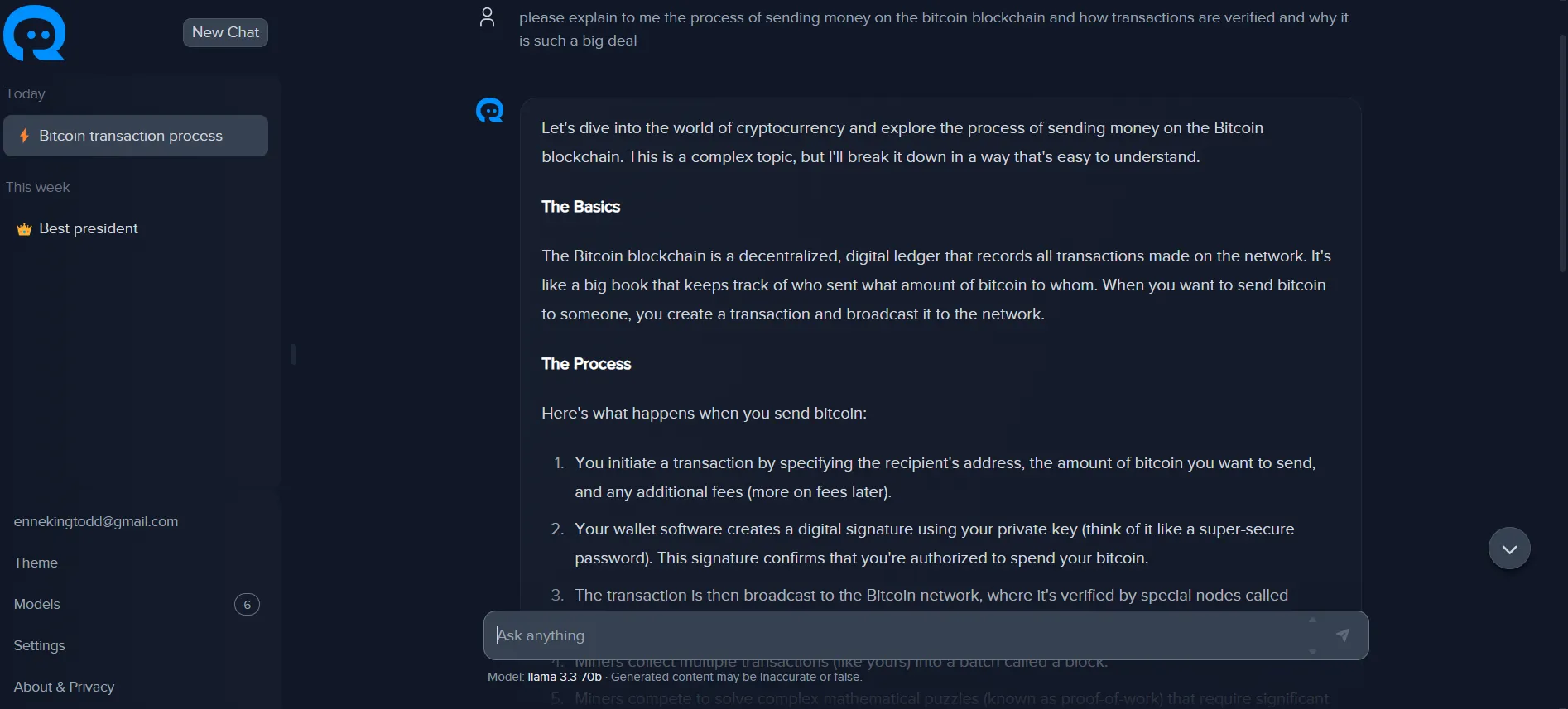
There are currently some open-source implementations that are a lot more powerful at arguably similar sizes.
For example, Llama-3.1-Nemotron-70B-Instruct could easily substitute the newer (but not better) Llama-3.3-70b, and Deepseek R1 is leaps ahead of Meta’s Llama 3.1 405b, being the best open-source model to date.
Overall, the experience was pleasant; the models performed as expected, and the interface was easier to use than Venice AI, its main competitor.
If you are looking for a privacy solution or want to try every AI tool available today, this feature is definitely worth a look. Just take into consideration that the search engine won’t replace Google, and the AI chatbot won’t replace ChatGPT—at least not yet.
Edited by Josh Quittner and Sebastian Sinclair
Generally Intelligent Newsletter
A weekly AI journey narrated by Gen, a generative AI model.
https://decrypt.co/304656/presearch-rolls-out-privacy-first-chatbot-pregpt-2-0-to-challenge-big-tech










